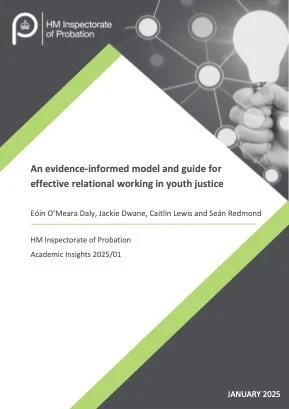By Eóin O’Meara Daly, Jackie Dwane, Caitlin Lewis and Seán Redmond
What does it mean for youth justice practitioners to examine their own relational practice with young people and consciously adapt their approach according to available evidence? This paper presents empirical findings from a project undertaken in Ireland that examined effective relationship building through complimentary processes of a systematic review of evidence, practice reflection, and action research – the latter has been described as a systematic collaborative approach where researchers and practitioners both conduct research and take action to simultaneously investigate and address an issue (Mac Naughton, 2001). The project was undertaken in collaboration with 60 youth justice practitioners from 16 Youth Diversion Project (YDP) case study sites across Ireland. YDPs are community-based focussed youth interventions that address offending behaviour with targeted young people to divert them from further involvement in crime (Reddy and Redmond, 2022). The 16 case study sites represent a purposive sample of 100 projects managed by over 30 youth organisations. Youth justice work in Ireland emphasises non-custodial alternatives to detention for young people who offend (Hamilton, 2023). These alternatives include community-based diversion, intervention and prevention strategies, and/or programmes that focus on addressing risk and need (Convery and Seymour, 2016). Youth justice practitioners are frontline workers trained in youth work, social care or similar disciplines who engage with referred young people to help reduce their offending behaviour. Building relationships with young people for crime diversion purposes accounts for a substantial proportion of youth justice practitioners’ time and taxpayers’ investment in Ireland. It has been argued that without the relationship between the youth justice practitioner and the young person, there is no intervention (DCYA, 2014). However, little is known about what constitutes effective relationship building in youth justice (Fullerton et al., 2021). As a result, policymakers and practitioners have not been able to fully understand the extent to which relationships can help divert young people from crime. In 2021, as a first step in understanding the ‘black box’ of relational practice, the Research Evidence into Policy, Programmes and Practice (REPPP) project in the School of Law, University of Limerick, published a systematic evidence review to present the international evidence regarding the development of effective relationships for youth crime diversion (Fullerton et al., 2021). The findings provided a summary of evidence relating to building and maintaining effective relationships between professionals and young people in youth justice settings. The review proposes that ‘the core skills involved in developing effective working relationships with young people include active listening, taking the time to get to know the young person, empathetic responding, advising, guiding, modelling pro-social behaviours and challenging ideas and behaviours in a non-threatening or judgemental manner’ (Fullerton et al., 2021, p. 8). The next step, and the substance of this paper, was to learn from youth justice practitioners working at the frontline with young people. Action research was used to more closely examine existing relational practice and then develop a new evidence-informed model and guidance. The new model is informed by international evidence from the systematic evidence review and a substantial reservoir of tacit knowledge shared by youth justice practitioners.
Manchester, UK: HM Inspectorate of Probation, 2025. 13p.


